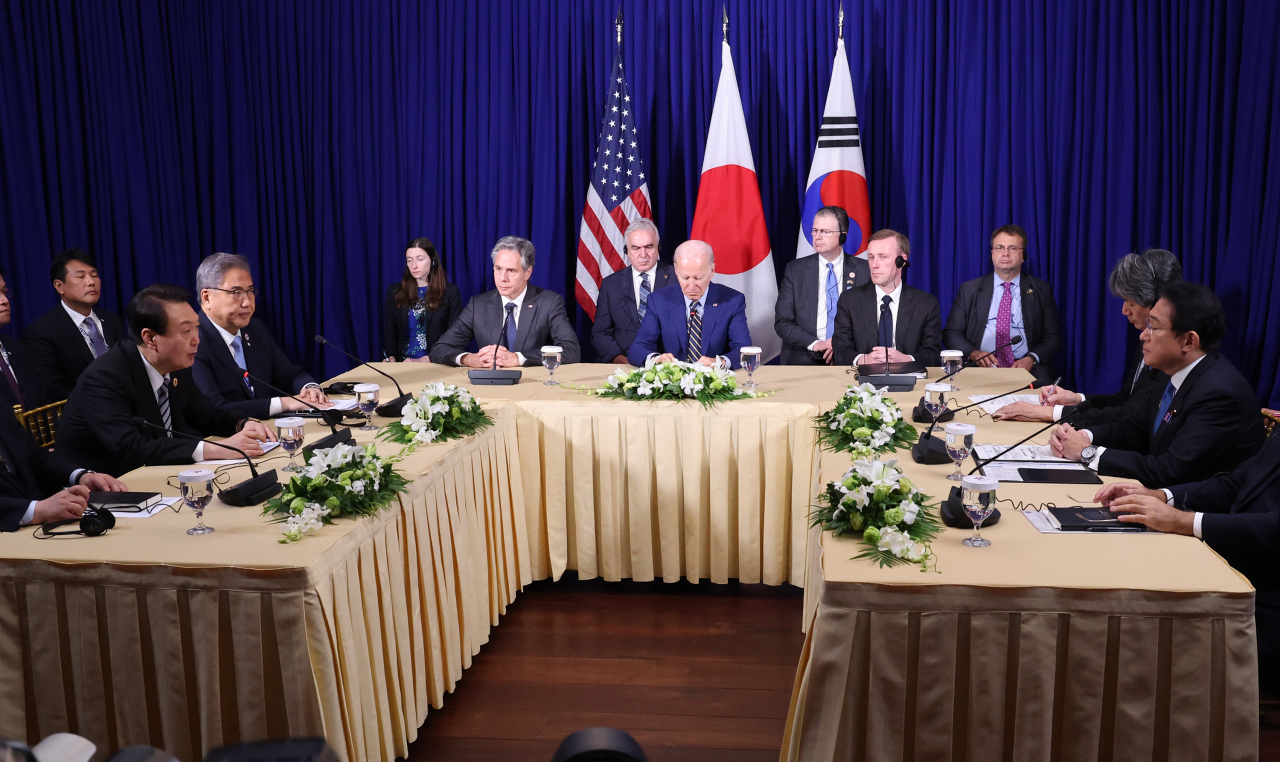 |
President Yoon Suk-yeol speaks at the summit with the US and Japan held on the sidelines of the ASEAN Summit in Cambodia on Sunday. (Yonhap) |
The leaders of South Korea, the US and Japan met on the sidelines of the ASEAN Summit in Cambodia on Sunday afternoon, expressing concerns about North Korea’s continued provocations and agreeing to strengthen the trilateral cooperation against the threats.
They released a joint statement promising to strengthen deterrence against the North and share real-time information on its missiles among the three countries.
"North Korea is making more hostile and offensive provocations based on confidence in its nuclear and missile capabilities," President Yoon Suk-yeol said in a speech at the multilateral summit.
Yoon told the two leaders that North Korea launched about 50 missiles since he took office in May and has been “firing intensively” from late October to early November.
He expressed concerns that one of the missiles crossed the eastern Northern Limit Line, landing in international waters between Sokcho, Gangwon Province, and the island of Ulleungdo.
“This is the first time since the division of the country, and it is a very serious provocation,” Yoon said.
President Biden also stressed the trilateral partnership with South Korea and Japan to respond to North Korea's continued provocations.
Biden said trilateral cooperation is "extreme, it’s extensive and it’s real." He added "it’s going to be sustained."
"For years, our countries have been engaged in a trilateral cooperation out of a shared concern for the — for the nuclear and missile threats North Korea poses to our people," he said. "North Korea continues provocation -- provocative behavior. This partnership is even more important than it’s ever been."
Prime Minister Fumio Kishida also warned against North Korean provocations.
In his remarks, Kishida said the provocations by North Korea were continuing and further provocations were expected. It is timely that the Korea-US-Japan summit was held today, he said.
Kishida said that Japan planned to respond resolutely by further strengthening the relationship with the two countries.
Joint statement
After the summit, the three leaders released a joint statement pledging to enhance deterrence against the North.
According to the statement, they would coordinate sanctions against North Korea and work together to close gaps in the international sanctions regime to ensure all relevant sanctions were fully enforced. However, the path to dialogue “remains open” toward peaceful and diplomatic resolution with the North, and the leaders called on the regime to return to negotiations.
The three countries will work together to strengthen deterrence. President Biden reaffirmed that the US commitment to reinforce extended deterrence to South Korea and Japan would only get stronger.
To strengthen deterrence, the leaders agreed to share North Korean missile warning data in “real time” among the three nations to improve each country’s ability to detect and assess the threat posed by incoming missiles, the statement said.
The statement explicitly mentioned Russia and did not mention China, although they affirmed their stance on Taiwan.
“The leaders affirm their commitment to stand with Ukraine against Russia’s unprovoked and brutal war of aggression against Ukraine that has shaken the foundation of the international order,” the three leaders said.
The three leaders emphasized that their basic positions on Taiwan “remain unchanged” and reiterated the importance of maintaining peace and stability across the Taiwan Strait as an indispensable element of security and prosperity in the international community.
Yoon met Kishida separately. The leaders of the two countries sat face to face two months after their first meeting at the UN General Assembly in New York in September.
The presidential office said in a press release, "The two leaders evaluated that active communication between diplomatic authorities is taking place on pending issues between the two countries, and said that they should continue to consult for an early resolution."
The “pending issue” seems to mean the issue of compensation for forced labor during World War II, which is considered the biggest challenge for restoring Korea-Japan relations.
Kyodo News quoted Kishida as saying that the two agreed to seek an early resolution to the forced labor issue.
US Inflation Reduction Act
Before holding the multilateral summit, the leaders of Korea and the US talked bilaterally and discussed the issue of amending the US Inflation Reduction Act, which suspended subsidies for Korean electric vehicles.
Yoon asked for Biden’s reconsideration of the US Inflation Reduction Act, which could negatively affect Korean electric vehicle makers in the US due to discriminatory subsidies.
Yoon reminded him of previous talks, saying, “In October, President Biden confirmed the US intention to sincerely consult on the Inflation Reduction Act.” When Yoon visited New York to attend the United Nations General Assembly, he briefly met with Biden and asked for a solution to the issue.
In response, Biden hinted at possible changes in the act in the future.
According to the Korean presidential office, Biden said Korean companies contribute greatly to the US economy in the fields of automobiles and electric batteries and considering these points, the implementation of the Inflation Reduction Act should be discussed.







![[Today’s K-pop] Blackpink’s Jennie, Lisa invited to Coachella as solo acts](http://res.heraldm.com/phpwas/restmb_idxmake.php?idx=644&simg=/content/image/2024/11/21/20241121050099_0.jpg)